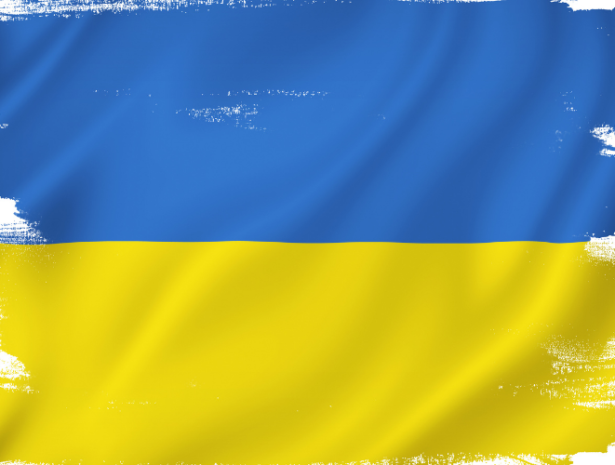Russia’s war against memory
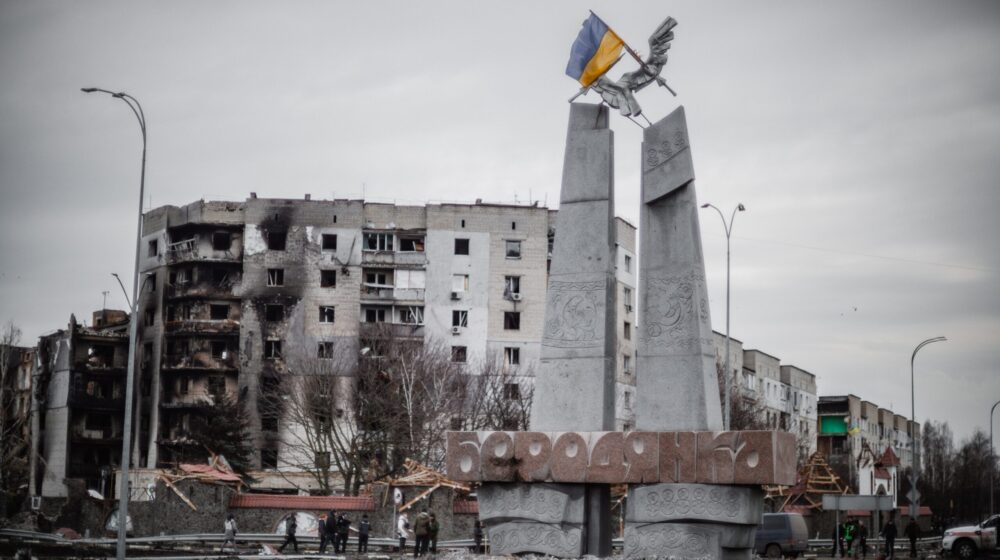
Historical revisionism, Holocaust trivialization, and conspiracy theories have been key elements of Russian war propaganda since the war of aggression began a year ago. In the following interview, Floriane Azoulay, the Director of the Arolsen Archives, talks about how this propaganda spreads and how it works, discusses possible solutions, and invokes a new European culture of remembrance.
How is the war in Ukraine changing the culture of remembrance?
The war has been taking place right before our eyes for a year now, and we have witnessed all the terrible consequences it brings. We see cities being destroyed, we see dead bodies, we hear about the kidnapping and abduction of children, we know that murder and rape are taking place. And because of our geographical proximity and the many family ties that exist between Ukrainians and Germans, we are seeing people flee – there are more than one million Ukrainians in Germany today.
This is a powerful experience which affects us all and influences the way we view the history of the 20th and 21st centuries. We now realize that a certain way of looking at history may have blinded us to the dangers Ukraine has been facing for the last 20 years. This experience will unquestionably have a major impact on the way we deal with remembrance. It is as if an extra layer is being added. We need to look through this new lens as we reimagine our culture of remembrance. I must add that it is unfortunate this did not happen in the 1990s, in the aftermath of the wars in former Yugoslavia and the genocide in Bosnia.
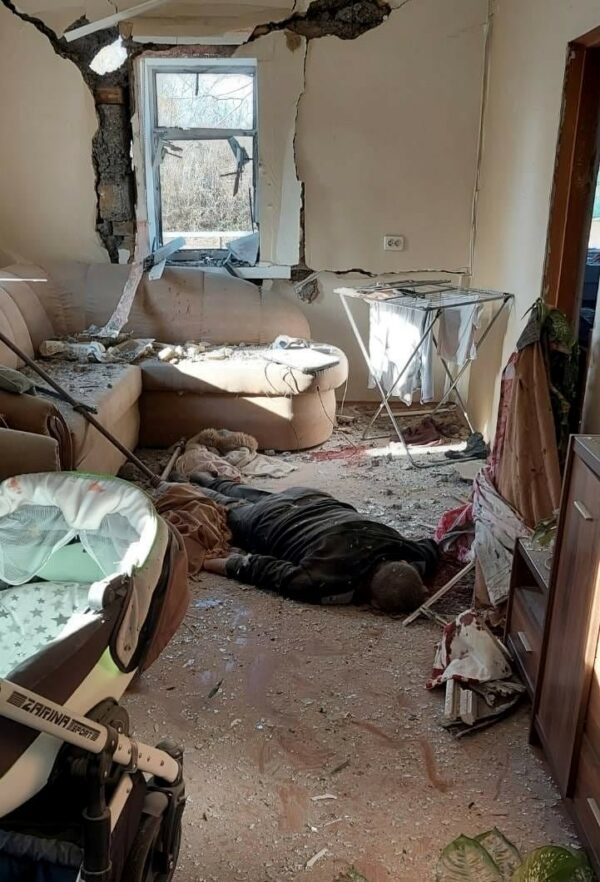
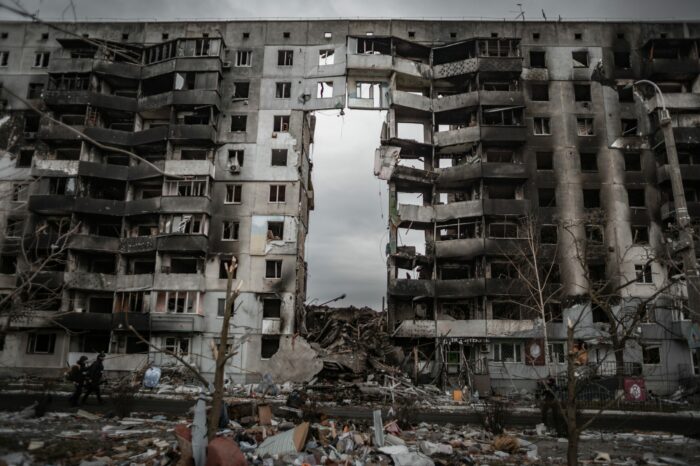
A year of war against Ukraine
Destroyed cities, images of dead people and news about abducted children – the war in Ukraine has been going on for a year. Because of the geographical proximity and family ties between Ukraine and Germany, we are all witnesses of the war.
Conspiracy theories as Russian war propaganda
Ever since the war of aggression started, Putin has kept repeating the claim that Ukraine needs to be “denazified.” How has this narrative evolved during the first year of the war?
The Russian regime tries to justify its war by claiming that Ukraine is run by Nazis and that its own aim is to denazify Ukraine. Putin asserts that Ukraine is committing genocide against the Russian-speaking population in the east. This narrative is being expanded upon and reinforced all the time. Statements on Russian state television are just one example of how this is achieved. When the German government agreed to supply tanks to Ukraine, it did not take long before Chancellor Olaf Scholz was being compared to Hitler.
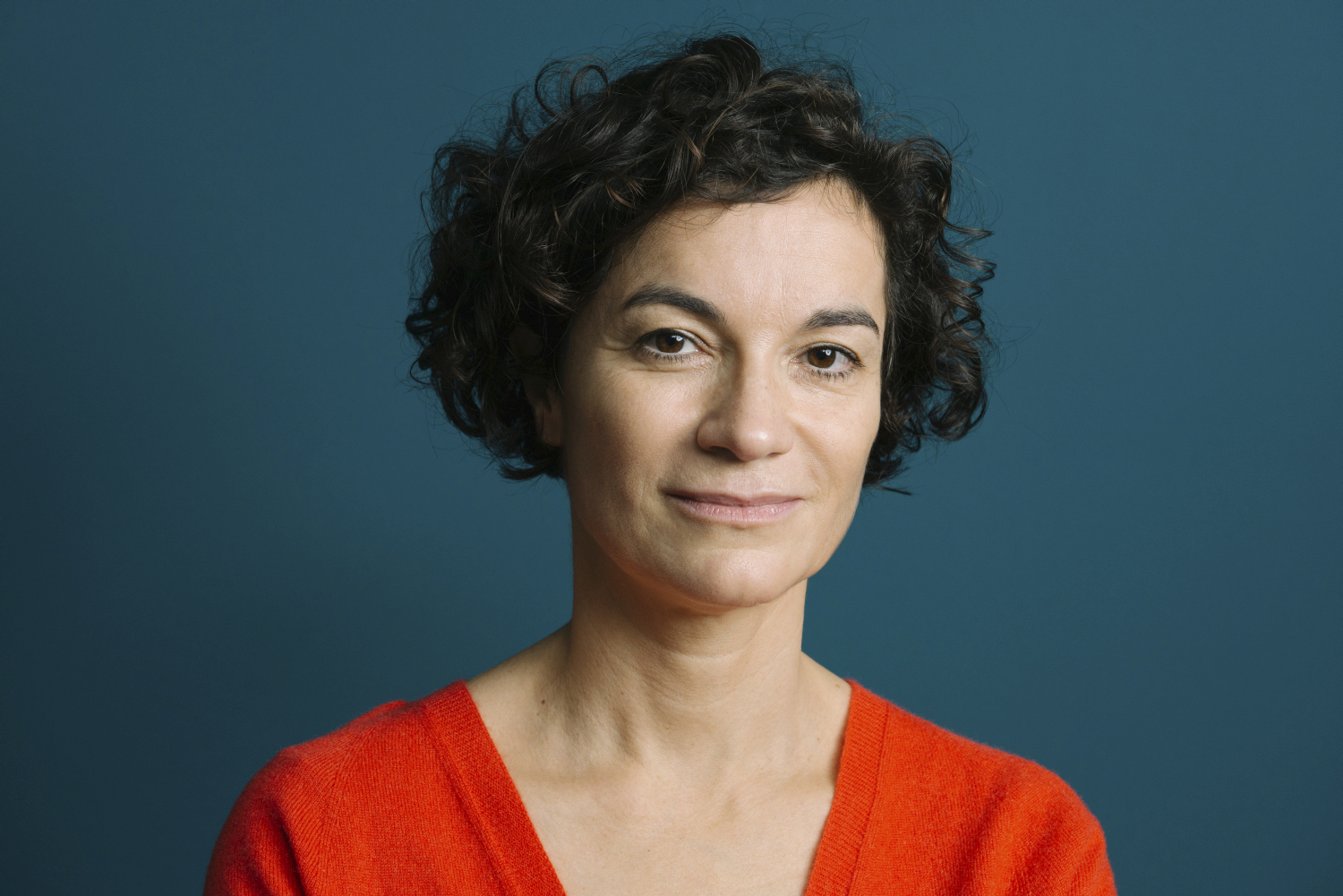
»The Russian government is using the politics of memory as a weapon.«
Floriane Azoulay, Director of the Arolsen Archives
The Russian government uses various conspiracy theories, especially antisemitic ones. What influence does this have on the Russian population, and on people in other countries?
That is correct. Examples include Russian Foreign Minister Sergey Lavrov’s assertion that Adolf Hitler “had Jewish blood too” when he was talking about the Ukrainian president. He was drawing on the antisemitic conspiracy narrative that Jews themselves were to blame for the Holocaust.
Theories are also circulating in Germany – and in France, too – that the war is a response to NATO provocation, a response to an alleged “humiliation” of Russia. But also that Putin is trying to save the world from a global elite – this is an allusion to World War II, of course, and another antisemitic trope. What is worrying about this is that young people in particular can access these conspiracy theories very easily on social media platforms like TikTok. Surveys paint a clear picture – those generations that have grown up with social media are much more likely to believe conspiracy theories and revisionist narratives. The more followers someone has, the more credible their account is – this tends to be the general consensus. Research conducted by CEMAS (Center for Monitoring, Analysis, and Strategy) shows that between April and November last year, the number of people who believe Putin is taking action against a global elite rose from 32 to 44 percent.
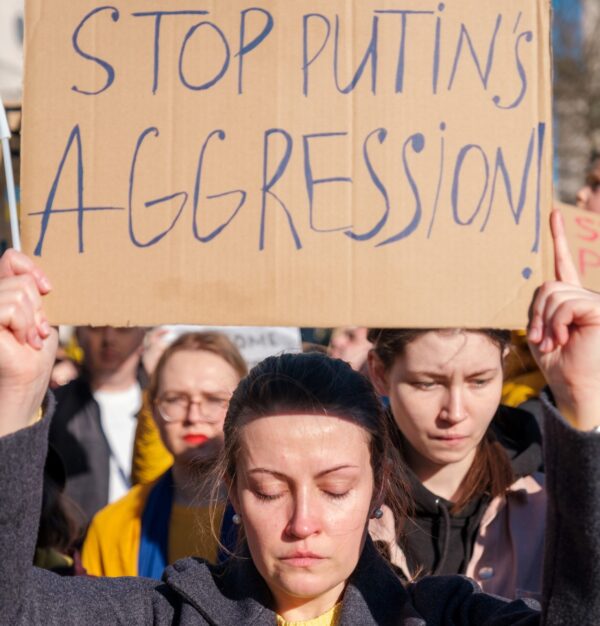
A woman is protesting against the war in Ukraine (Photo: Ehimetalor Akhere Unubona)
The politics of memory as a weapon
Does that mean history is being weaponized?
Yes, I would definitely say that the Russian government is using the politics of memory as a weapon. Over the past year, we have seen a great change in the way people think about the past. We live in digital spaces, especially the younger generation, and this has a huge influence on how we learn and on what we think is right or wrong. We are experiencing a polarization of societies all over the world, an erosion of our sense of social cohesion. Populist parties and regimes resort to a wide range of different means, including antisemitism, racism, xenophobia – even sexism and homophobia – in their efforts to strengthen national identities. They use the politics of memory as a means of sowing division rather than promoting integration. History is being rewritten.
What are the Arolsen Archives doing to combat historical revisionism in relation to Ukraine?
We are focusing our efforts on saving documents from destruction in Ukraine so that they can be preserved and made accessible for future generations. Many archives have been damaged in the war. We also know that there has been looting and destruction, and we can assume that Russian occupation will involve the destruction/confiscation of sources that could refute the Kremlin’s official version of Ukrainian history.
In this version of history, Ukrainians are not the victims of the Nazis’ brutal policy of extermination, they are collaborators; in this version of history, it is Russians who are the heroes of World War II, not Ukrainian soldiers. What is more, we know that the destruction of infrastructure makes it impossible to store archival material in acceptable climatic conditions. Paper from the World War II era is particularly fragile because it is of poor quality. Holdings that have not been digitized may well be lost forever. So we have made it our priority to provide support in the areas of digitization and the safeguarding of cultural assets. One example is the work we have been doing with the Vinnytsia State Archive to digitize 500,000 personnel files on liberated prisoners of war and forced laborers.
“A digital journey through Ukraine”
What can be done to make young people more aware of conspiracy theories and war propaganda?
I think we need to apply a holistic perspective to teaching, because historical-political education has many facets. Acquiring knowledge and researching the past are important, but reflecting on our own prejudices and stereotypes is important too. I often feel that people expect too much – as if a visit to a memorial site could be a “cure” for antisemitism. Educational work is important, but it is not enough. The culture of memory requires knowledge, and that is a formidable challenge. General knowledge about the Second World War and National Socialism is declining throughout Europe.
We need to share knowledge in ways that arouse people’s interest. One approach is to make use of the interest generally shown in exploring authentic sources, as we do in our #everynamecounts project. We need to create more opportunities for young people to get involved and become active participants who make a visible impact on the present and the future themselves. That puts the focus of the educational process on the issue of responsibility.
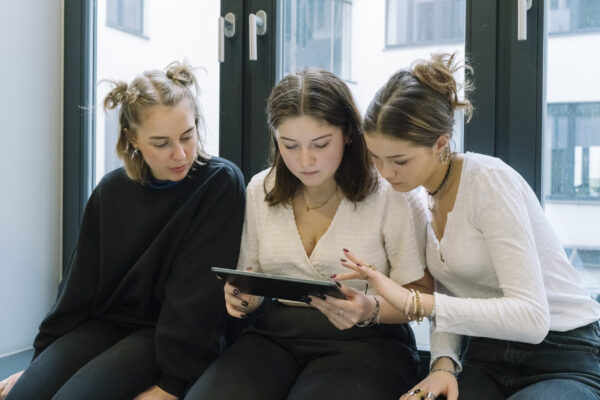
Students taking part in #everynamecounts (Photo: Arolsen Archives).
Discrimination and hate need to be understood and should be taken much more seriously – it always starts with words, and early intervention is essential here. Other important aspects are providing victims with support so they feel confident enough to report assaults etc. and ensuring that hate crime is really seen – and treated – as a crime.
Working towards a European culture of remembrance
A modern culture of remembrance needs to relate to the fundamental questions that young people grapple with, but also to the questions that concern other age groups – only then can self-reflection on personal prejudices follow. At the same time, it is important to take advantage of the opportunities offered by digitization and to find effective ways to combat the risks involved. Young people need to be able to access sources across Europe from the comfort of their own home if they are to understand transnational aspects and relationships. Their research could take them on transnational journeys, giving rise to a “European culture of remembrance.” Visits to memorials remain important, but they should be combined with digital journeys to enable students to visit places that do not have a memorial and places that students simply cannot get to – Ukraine is a case in point.

